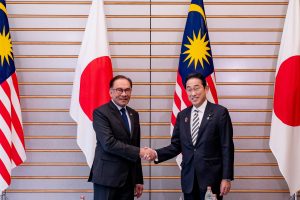Japan and Malaysia have announced the elevation of their relationship to a Comprehensive Strategic Partnership, with security assistance figuring as a key area of growing cooperation.
The announcement came as Japan’s Prime Minister Kishida Fumio and his Malaysian counterpart Anwar Ibrahim met on the sidelines of the ASEAN-Japan Commemorative Summit in Tokyo on Saturday, the Malaysian Foreign Ministry said in a statement. The three-day summit, which ended yesterday, marked 50 years of ties between Japan and the Association of Southeast Asian Nations (ASEAN).
The elevation of bilateral relations from the current strategic partnership, formed in 2015, “marks a new chapter in Malaysia-Japan bilateral ties,” the statement added. “Malaysia is confident that this renewed commitment will lead to even closer cooperation and greater benefits for both countries.”
The upgrade was accompanied by the signing of a security assistance deal that includes a grant of 400 million yen ($2.8 million) to boost Malaysia’s maritime security, amid the current growing frictions in the South China Sea. Japan will provide equipment such as rescue boats and supplies under the security deal, Reuters reported. A report from The Star, a Malaysian newspaper, stated that the deal would involve the provision of “monitoring and surveillance equipment.”
In a joint statement issued on Saturday, the two sides said that they “also confirmed their intention to strengthen further cooperation between the Japan Coast Guard and the Malaysian Maritime Enforcement Agency.” As tension rages in the South China Sea due to recent Chinese incursions into regions of the Philippines’ exclusive economic zone, the statement added that “both leaders reaffirmed their commitment to peace, stability and prosperity in the region and beyond, and to upholding international law, including the United Nations Charter.”
The agreement represents the latest fruit of Japan’s Overseas Security Assistance (OSA) program, which as Collins Chong Yew Keat wrote in The Diplomat last month, was first announced in the country’s revised National Security Strategy at the end of last year.
The security deal came after Kishida’s state visit to Malaysia in early November, when he and Anwar confirmed that they “would accelerate coordination for the implementation” of OSA programs. They also “concurred to further strengthen cooperation in the maritime field, including joint training and exchanges between the Japan Self-Defense Forces and the Malaysian Armed Forces as well as joint training between coast guard agencies of the two countries.”
Under the OSA plan, Japan will help recipient nations bolster their defenses in a significant break with the country’s existing rules, in place since World War II, that forbid the use of international aid for military purposes. In a statement released in April, the Ministry of Foreign Affairs said that “by enhancing their security and deterrence capabilities, OSA aims to deepen our security cooperation with the countries, to create a desirable security environment for Japan.”
While OSA cannot be used to buy lethal weapons that recipients could use in conflicts with other countries – Japan’s postwar pacifism still reigns here – they can be used to strengthen communications and surveillance systems. In addition to Malaysia, the OSA’s initial recipients include the Philippines, Bangladesh, and Fiji – all strategically located nations facing challenges to their maritime security, most particularly from China.
Japan’s security arrangement with Malaysia follows a similar deal with the Philippines, which Kishida also visited in early November. During the visit, Reuters reported, Kishida and President Ferdinand Marcos Jr. expressed their shared concerns about “unacceptable” attempts to “unilaterally change the status quo by force” in the East and South China seas. Kishida said during the visit that Japan and the Philippines were in talks on “a reciprocal access agreement,” similar to the U.S. Visiting Forces Agreement, which would give Japanese soldiers access to the country’s military facilities. During the visit, Japan also gifted to the Philippines a coastal radar system valued at $4 million.
Tokyo is also making efforts to strengthen its relationship with Vietnam, another South China Sea claimant state, and announced a similar upgrade of its relationship to a comprehensive strategic partnership late last month. In announcing the upgrade in Hanoi, Kishida and President Vo Van Thuong agreed to broaden their security cooperation, particularly on the provision of Japanese defense equipment, maritime security cooperation, and technology transfers.
Japan’s growing maritime security cooperation with the nations of Southeast Asia, particularly those with skin in the game in the South China Sea, is a logical outgrowth and result of China’s increasingly belligerent assertion of maritime claims. The more that China pushes – and despite its pledges to advance the long-awaited Code of Conduct with the Association of Southeast Asian Nations, it shows no sign of releasing the pressure any time soon – the more that this cooperation can be expected to advance.

































